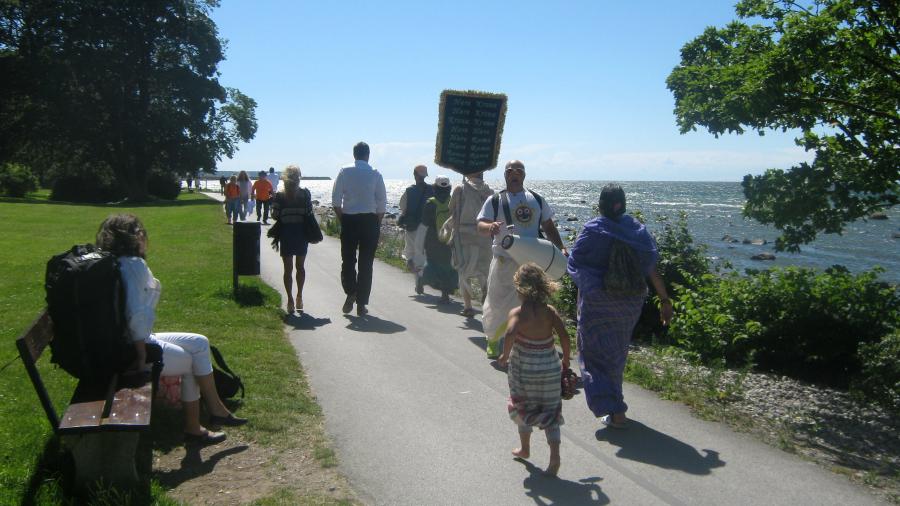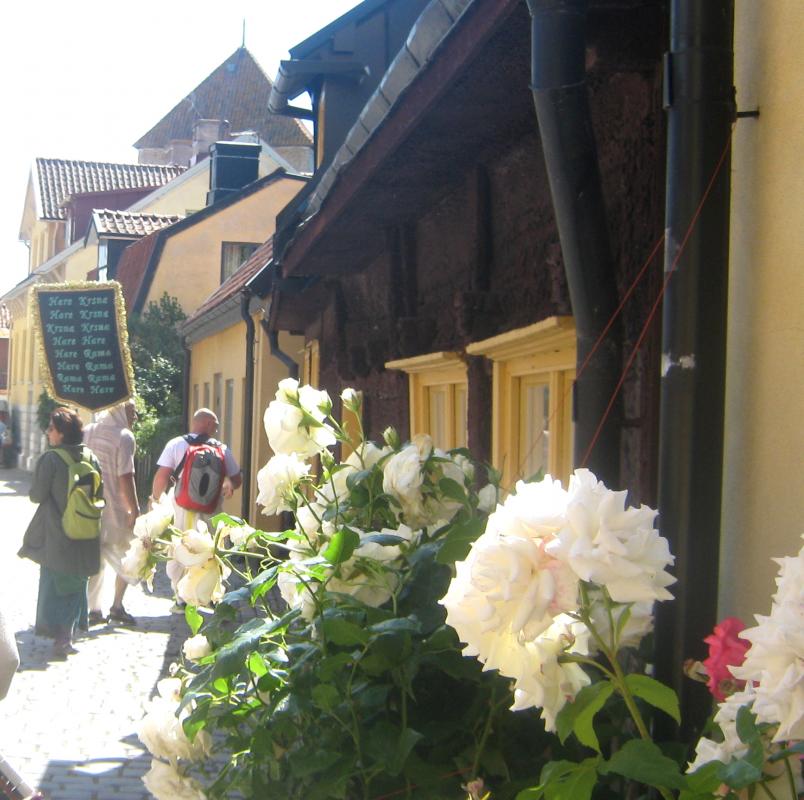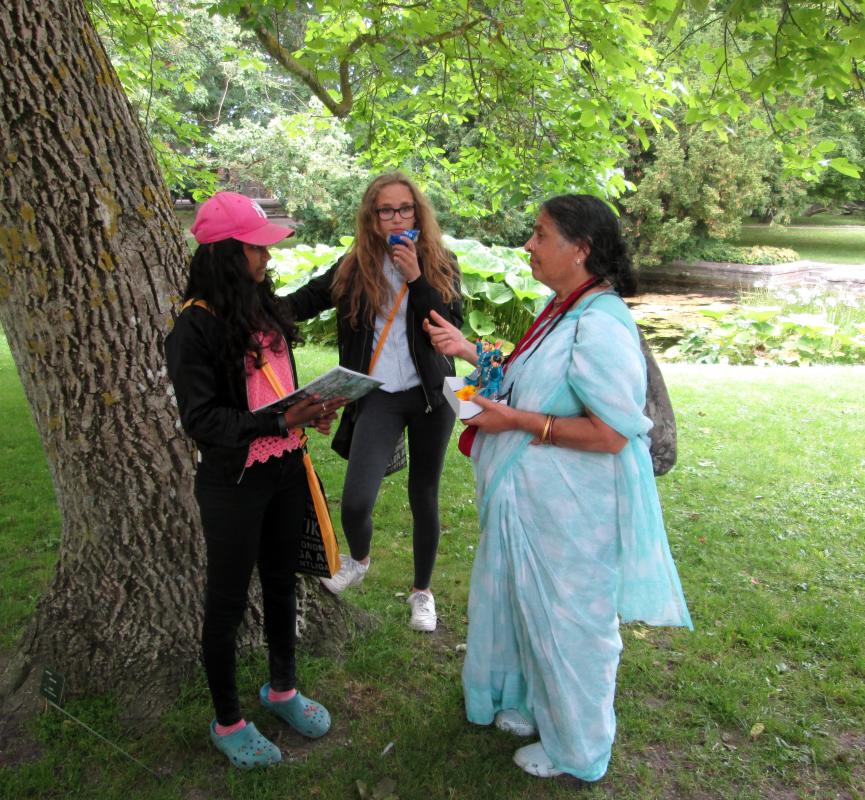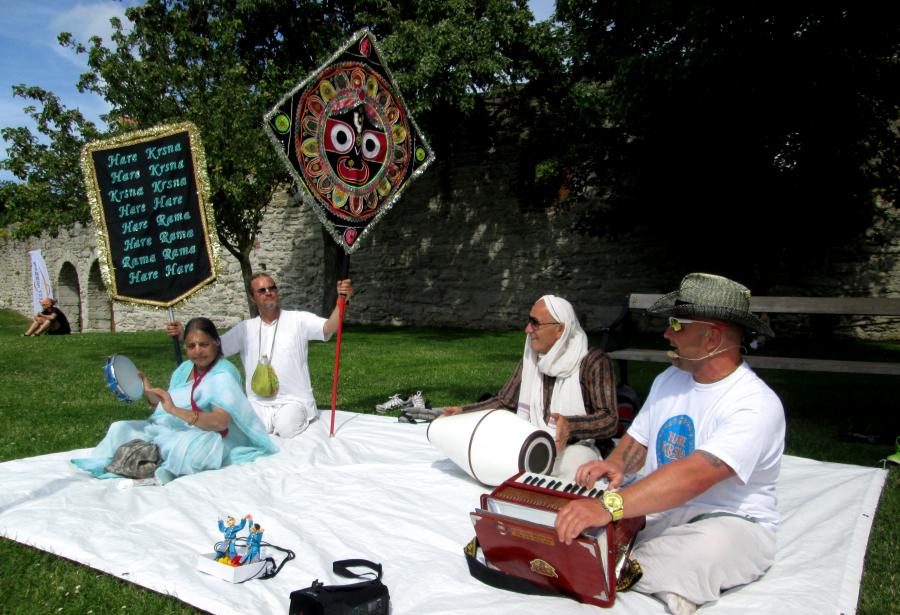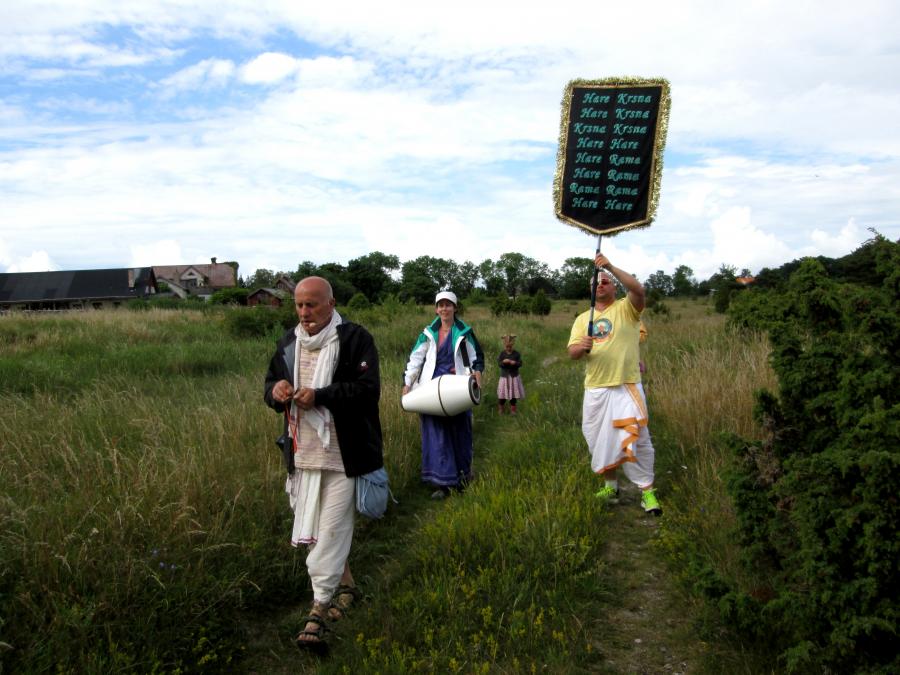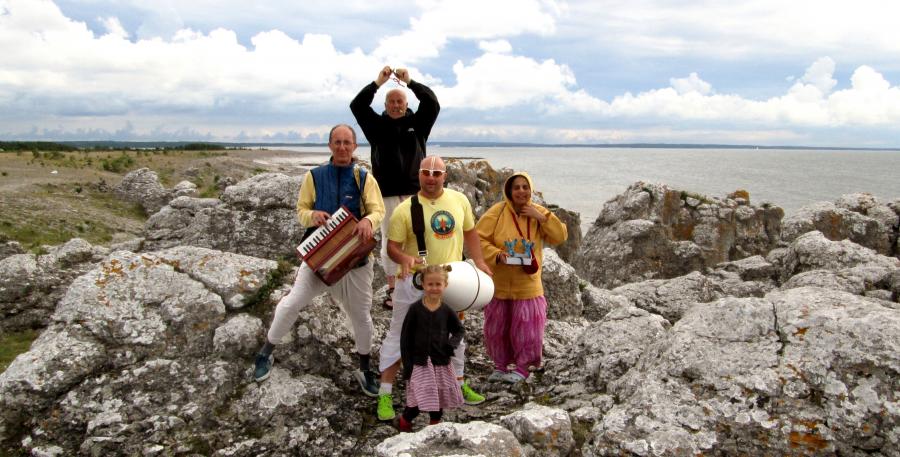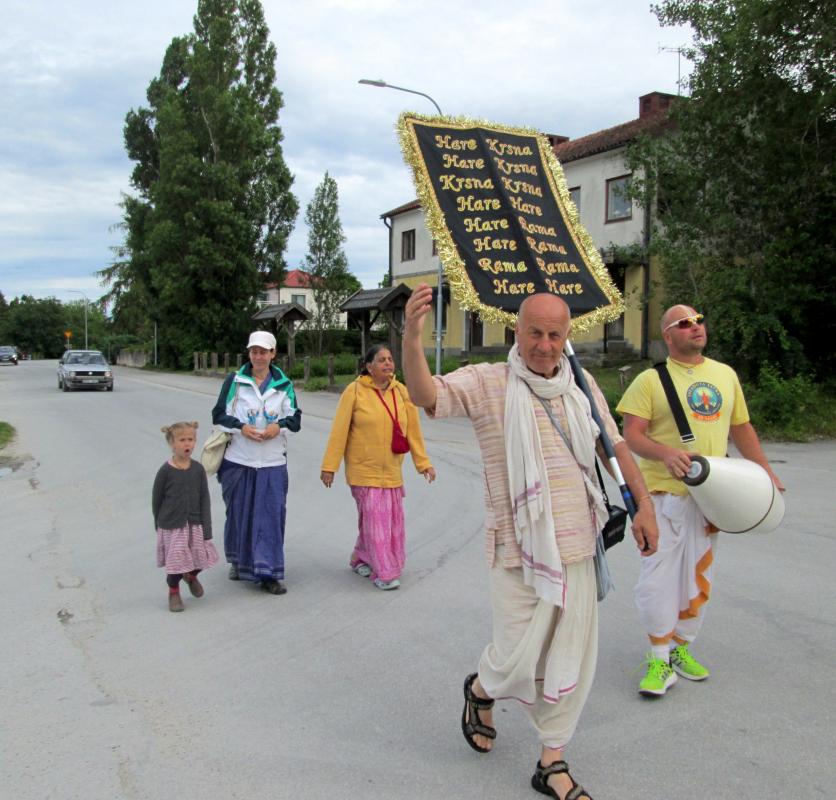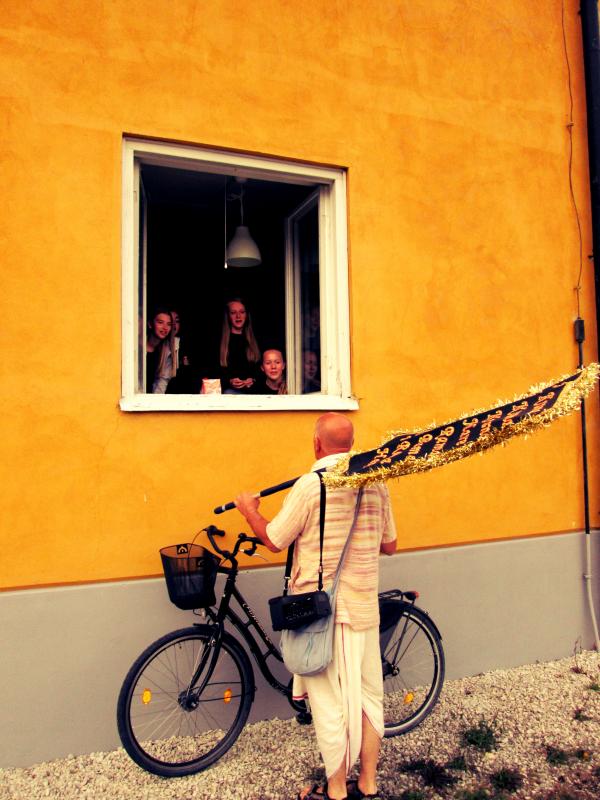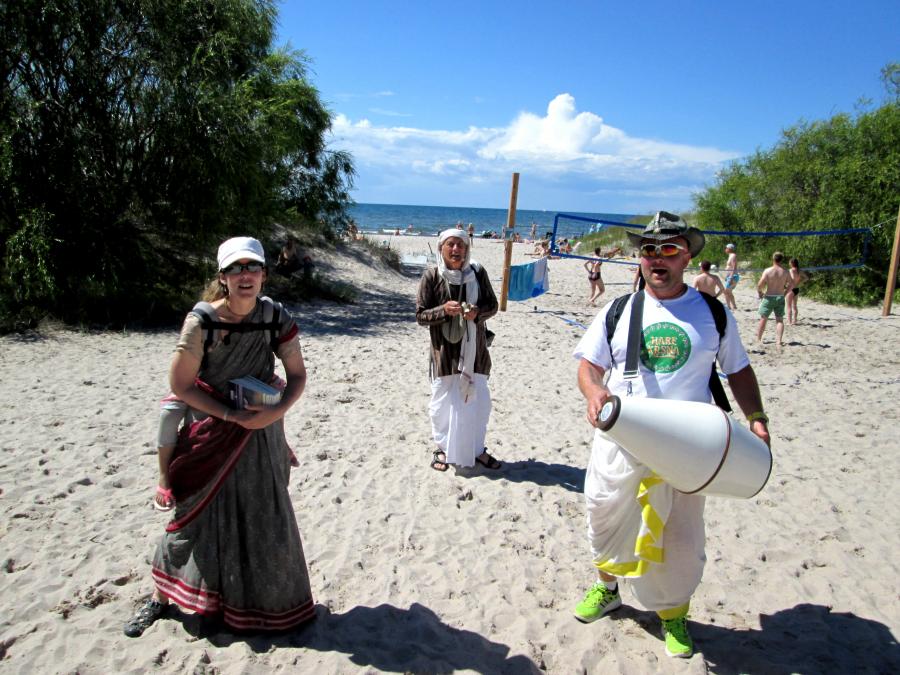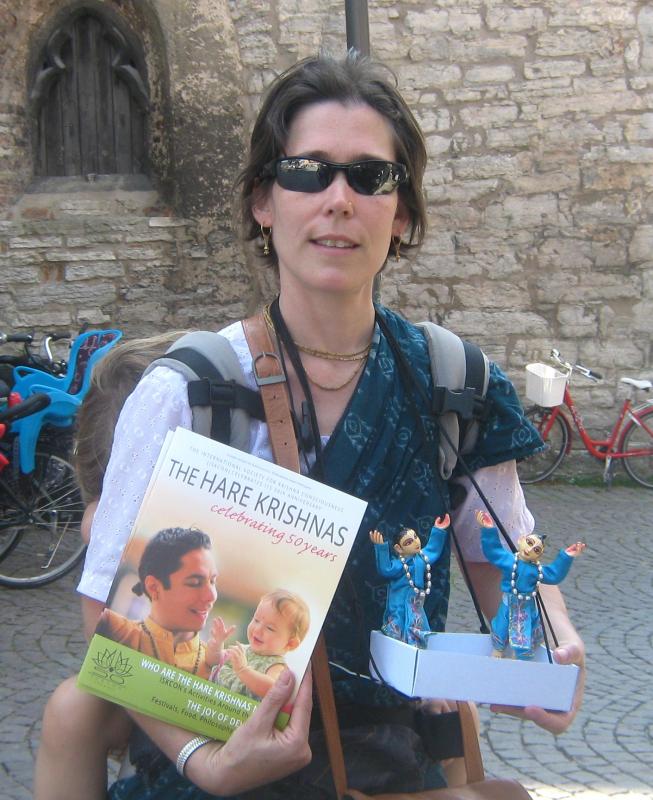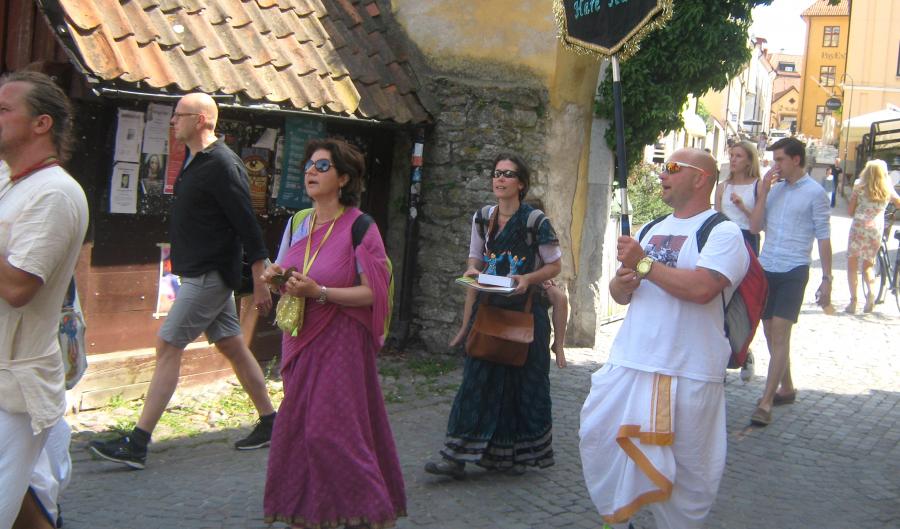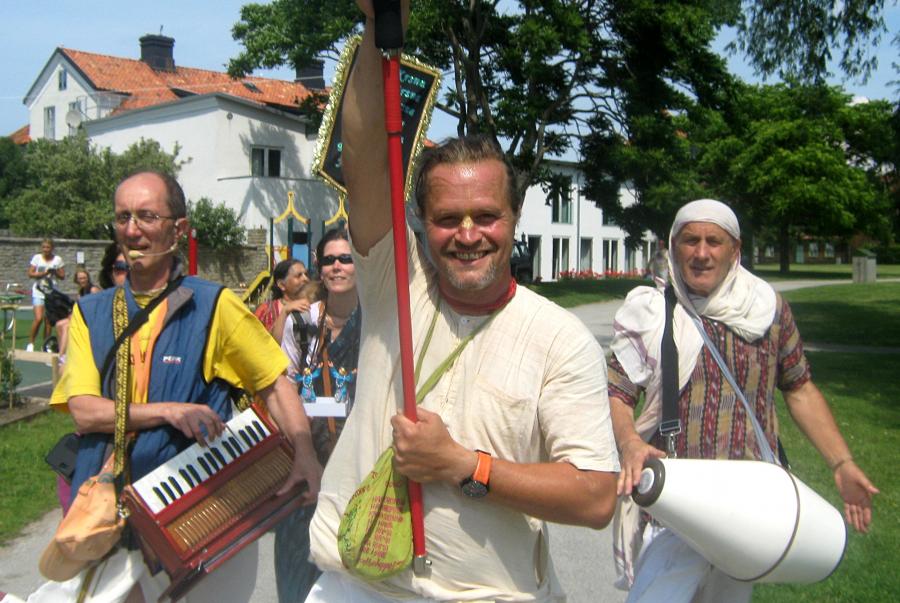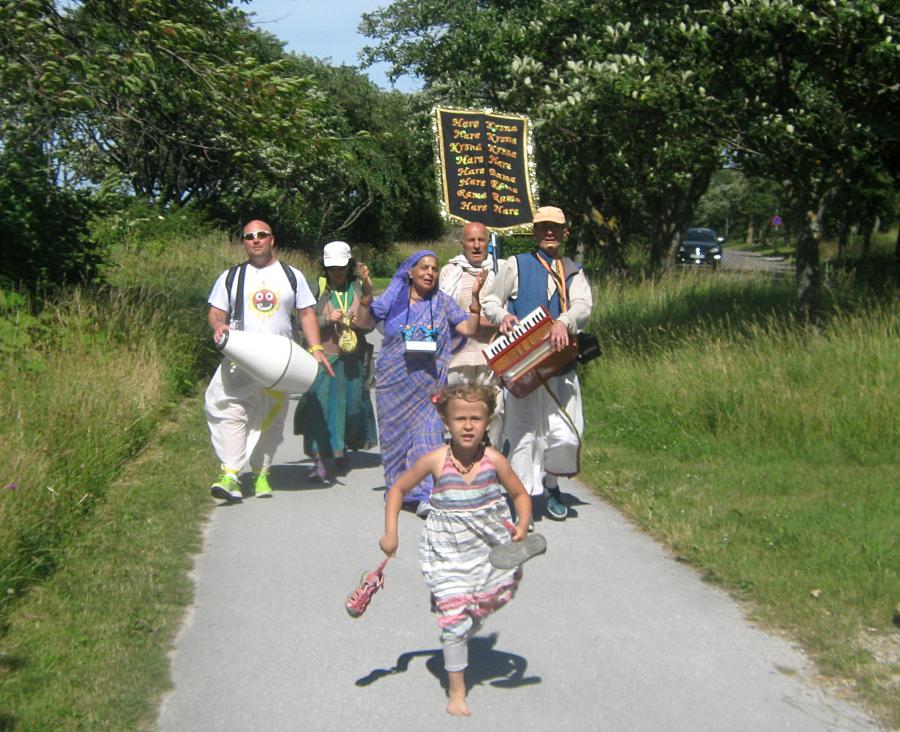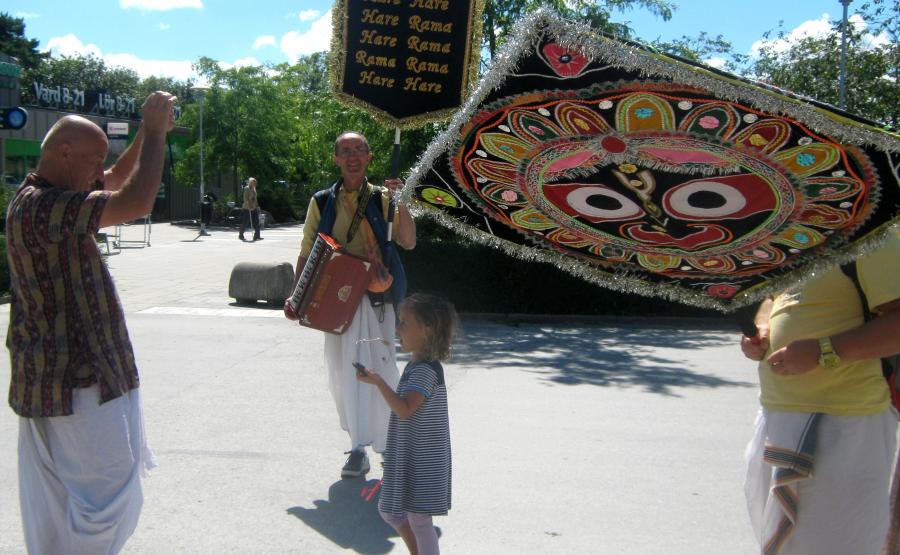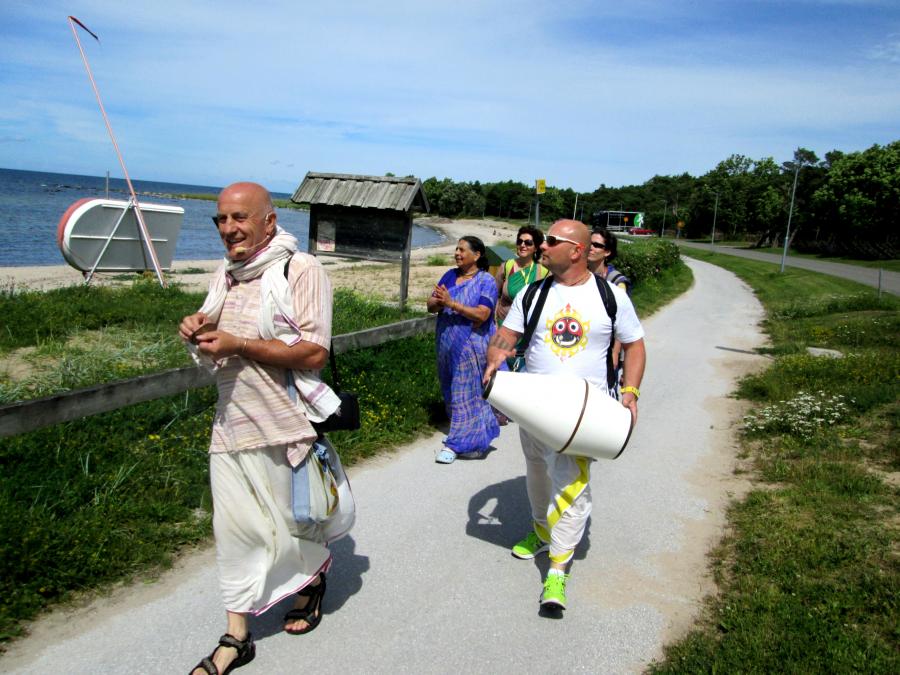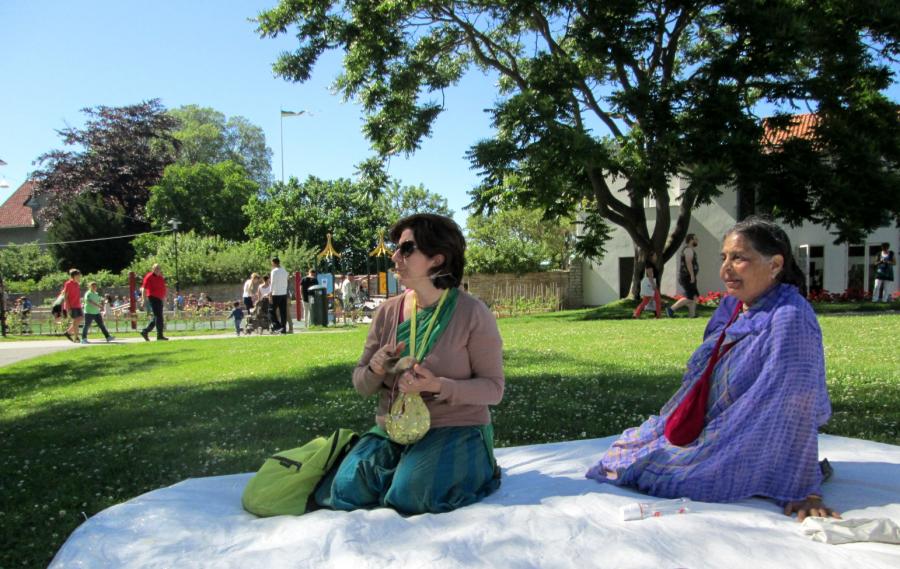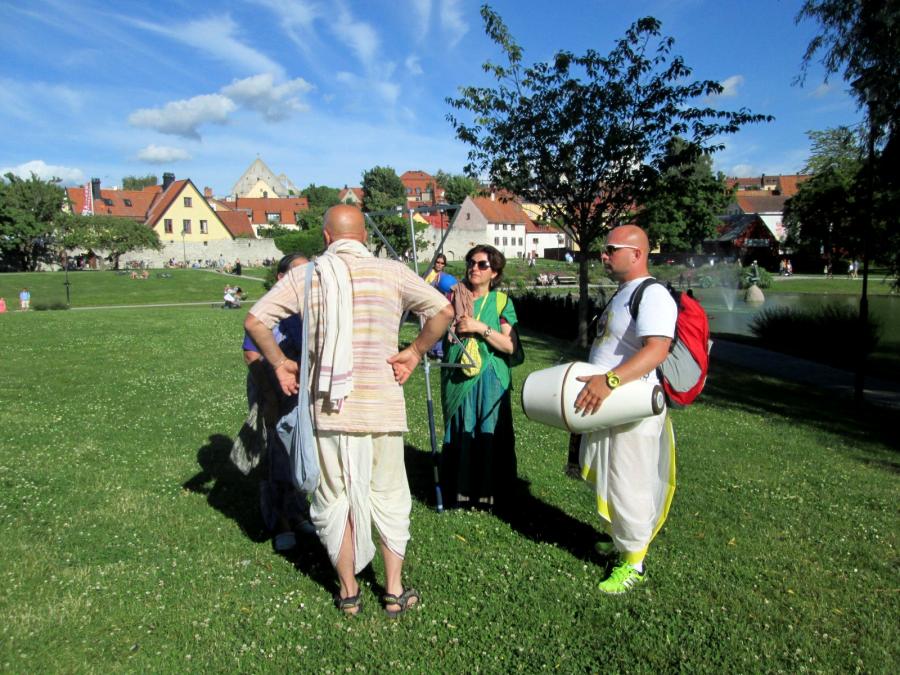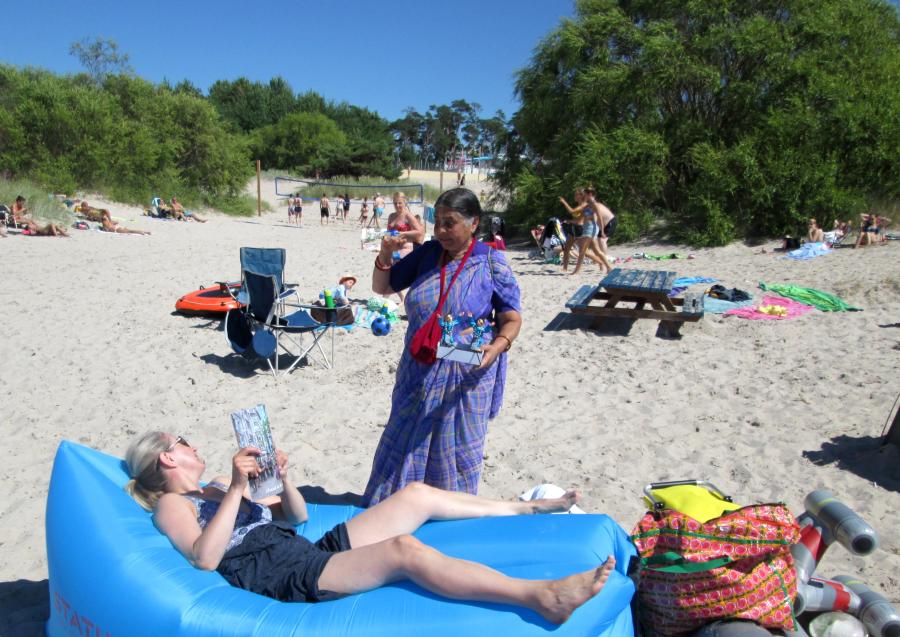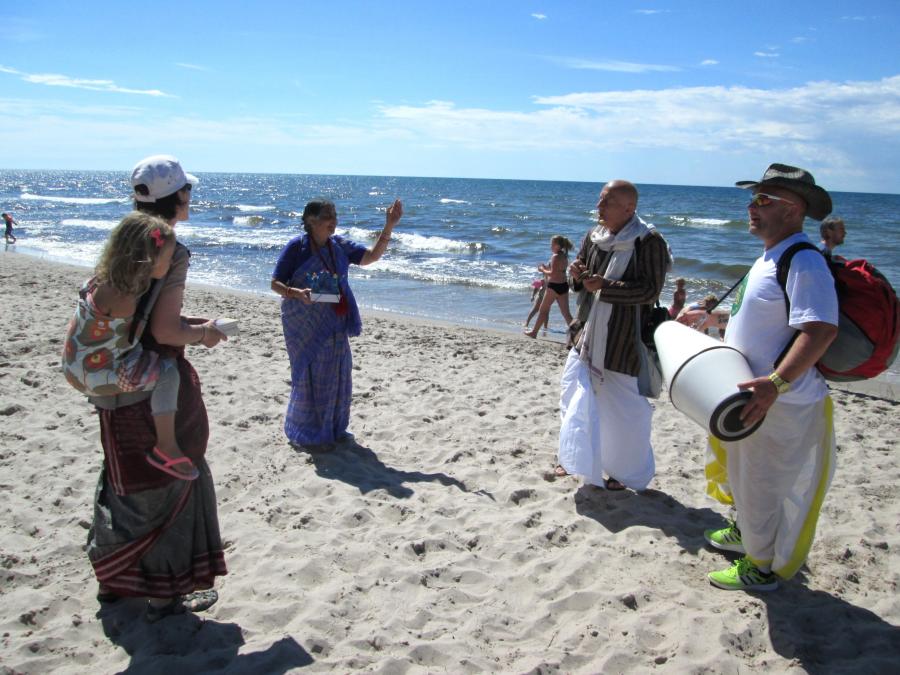By Chandrabhaga Dasi
Getting a team together
Gotland is one of Sweden’s largest islands with a population of 57, 221. So we decided to hold a padayatra there from July 1st to 8th. Our padayatra team included devotees from all three sister temples in the Stockholm area: Mandaleshvari Dasi from the Jarna/ Almviks Gard Temple; Bhakta Pavel and Prema Mayi Dasi from the Stockholm Temple, Madhavananda Dasa,myself and my young daughter Anapayini Devi from the New Radhakundatemple and lastly Upananda Dasa who was visiting from Bosnia for the occasion. Our party first met in another part of Sweden called Korsnas Gard at the New Radhakunda Temple, which also happens to be the Bhaktivedanta Book Trust (BBT)[1] headquarters of Sweden. Our plan was to spend one week on that island just 40 kilometres away from Korsnas Gard.
Settling for a week in the campground
Our party set off for the 4 hour long journey to the island on a luxury ferry which resembled more of a cruise ship. During the journey we talked about strategies for preaching and how we were all looking forward to meeting our representative, Bhakta Tomas –who had made arrangements for Sri Sri Nitai Gaurasundara to come and stay in Gotland for the padayatra. When we disembarked the ferry I felt a warm breeze –the weather was humid on the sunny island of Gotland. Shortly after, our contact arrived in his mobile home and we all loaded up our luggage and equipment , chanting on the way to the campground at ‘Snacks Strandby’. After arriving at the campground we tried to set up camp, only to find that the strong winds were making it almost impossible to secure our tents. We struggled but with some adjustments we were able to settle into our base camp, a place we would call home for the next 7 days.
Prasadam lessons as a bonus
For the duration of the padayatra we held morning programs and cooked together. Prema Mayi Dasi, a disciple of Tamal Krishna Gosvami, is a long time devotee of Stockholm who regularly conducts cooking courses at the temple ashrama (Brahma Kunda) and in universities. She took any opportunity to speak with people in the community kitchen at the campground and could often be found instructing them about vaisnava cooking, and sharing our meals with anyone who was interested. One woman from Iran who was visiting from Stockholm took our contact details as she was interested in taking one of Prema Mayi Dasi’s cooking courses and visiting the Govinda’s Restaurant at the Hare Krishna Centre. She, her son and mother all happily took prasadam.
Daily harinam sankirtana in the nearby towns and villages
Later on in the mornings, we would head out for harinama sankirtana. We walked 5 kilometres into the town of Visby, where the ‘Almedalsveckan’ or ‘The Week of Politics’ assembly was being held. Thousands of people gathered there to talk about the news of the hour regarding public policies. We would then walk through the picturesque neighbourhoods of what still resembled in many ways a medieval style town, with cobbled roads, and Tudor fashioned homes. Flowers cascaded from windows as we caroused through the streets eventually reaching a central park where we would stay for some time to do a ‘sitting’ harinama.
On other days, we visited the surrounding villages of Slithe, Faro, Tofta, and others on the way to and from Visby. In Slithe we found a large immigrant community from Bengal. These families were Muslim by practice, but very easily accepted our books. Two young ladies we had met there sat in on our harinama for some time, while Prema Mayi Dasi explained the meaning of the maha-mantra. Tofta being the local bathing spot many families had come there to enjoy the warm sunny weather at the beach. After walking on the beach for some time we settled down to chant the holy names. Prema Mayi Dasi took the opportunity to bring a group of children to come see our Sri Sri Nitai Gaurasundara deities whom we had brought along with us. The children clapped happily while repeating the maha-mantra.
Young Anayapini caught the preaching spirit
My daughterAnapayini devi took many opportunities to bring the children to our base camp in the campground. One morning Bhakta Tomas commented on how he wanted to invite our neighbours in the camp to attend the morning program. Soon after he had said this, Anapayini showed up with two young boys whom she had brought into the tent to see her toys and they stayed for the kirtana. On another occasion I was speaking with the mother and father of some children she was playing with. They were extremely curious about our lifestyle. They had many thoughtful questions about vaisnava grhasta life, and about the social structure of temple living. I gave them an ‘ISKCON 50th anniversary’ magazine which lays out a gorgeous presentation of Krishna Consciousness worldwide. The next day in the kitchen the mother revealed to me that her husband is a scientist who doesn’t accept any kind of religious belief systems – but despite this he genuinely showed interest in our community living practices, and appreciated our movement after reading through the whole magazine.
Devotees very happy to be walking in a natural environment
All the devotees felt inspired by the padayatra environment, and had many good realisations. Upananda Dasa felt exhilarated to be walking again after some years without padayatra. He was inspired to continue each year, either joining an existing padayatra or organizing a new one! He also felt a keen inspiration by connecting with nature again – sleeping outside, hiking to his camping spot and seeing forest animals all around. Madhavananda Dasa was happy to sleep on the ground again, a simple and healthy luxury the padayatra life provides. During our time on the island of Gotland we were also graced by the presence of the resident population of majestic swans. They were regularly swimming in the water by the beaches, and their graceful presence reminded us of the swanlike personalities who inspired and supported our preaching endeavours and who were perceptibly with us on our padayatra in Sweden.
All in all we spent 6 days in Gotland, visited 7 villages and distributed 75 ‘ISKCON 50th anniversary’ magazines and 70 books.
Padayatra ki jaya!
[1] A non-profit organization dedicated to the publication of Vedic literature.

